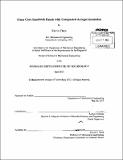Truss core sandwich panels with compacted aerogel insulation
Author(s)
Chen, Kevin, S.M. Massachusetts Institute of Technology
DownloadFull printable version (7.152Mb)
Other Contributors
Massachusetts Institute of Technology. Department of Mechanical Engineering.
Advisor
Lorna J. Gibson.
Terms of use
Metadata
Show full item recordAbstract
Silica aerogels are well known for their low thermal conductivity, approximately 15 mW/m-K. Their low relative density (typically less than 5%) reduces conduction through the solid and their small pore size, typically less than one hundred nanometers, on the order of the mean free path of air, reduces conduction through air as well as convection and radiation. As they are exceptionally fragile and brittle (flexural strength is typically 0.03-0.08 MPa), they are often used in a granular form in thermal insulation, with some increase in their thermal conductivity, to about 24 mW/in-K, from the air between the granules. Here, we describe a technique for compacting granular silica aerogel that reduces the thermal conductivity to 13 mW/m-K, roughly half that of the uncompacted aerogel. We also report on the development of a truss-core sandwich panel filled with compacted aerogel granules, designed to provide both mechanical support and thermal insulation to facilitate the practical commercialization of aerogel insulation, particularly in energy efficient building applications. Mechanical and thermal properties of the sandwich panel prototype were measured and compared with theoretical models available in literature. The models give a good description of the properties of aerogel-filled truss-core sandwich panels.
Description
Thesis: S.M., Massachusetts Institute of Technology, Department of Mechanical Engineering, 2013. Cataloged from PDF version of thesis. Includes bibliographical references.
Date issued
2013Department
Massachusetts Institute of Technology. Department of Mechanical EngineeringPublisher
Massachusetts Institute of Technology
Keywords
Mechanical Engineering.